Unregistered Syrian refugees face obstacles in Lebanon
Lebanon (MNN) — The United Nations stopped registering Syrian refugees in Lebanon back in May 2015. It’s been over two years now and the UN only formally recognizes just over one million Syrian refugees in Lebanon. However, they admit that that population today has probably almost doubled.
Plight of the unregistered refugee
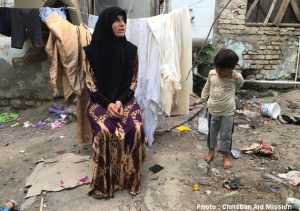
(Photo courtesy of Christian Aid Mission)
Camille* with Heart for Lebanon shares, “I was shocked to hear that the United Nations has stopped registering refugees in Lebanon since December 2015.… The key word here is those who are ‘registered’ with the United Nations. They would tell you there are easily an additional 600,000-700,000 refugees from Syria who live in Lebanon who are not registered.”
For displaced individuals, not being registered means you can’t get any government assistance. Any aid pledged by the UN can only go to registered refugees. This means around 40 percent of Syrian refugees in Lebanon are outside the reach of government aid.
“You’re talking about around 1.7-1.8 million [Syrian] refugees living in Lebanon. This is a country that has a population of 4 million individuals. After [those]1.8 million Syrian refugees, another 100,000 Iraqi refugees, and another half a million Palestinian refugees, more than half the population in Lebanon today is a refugee from a neighboring country.”
Restoring dignity
Heart for Lebanon is serving 3,000 Syrian refugee families each month — around 27,000 individuals — with schooling and physical aid.
Camille explains, “We are providing a basic food and hygiene supply package for every family on a monthly basis. This is roughly $80 worth of supplies of humanitarian aid, plus our opportunity to do the assessment…as well as follow-up visits we do almost on a daily basis.”
One of Heart for Lebanon’s focuses in refugee care is restoring dignity. And restoring dignity means more than dropping off aid and leaving. It means sitting, fellowshipping, spending time with refugee families, and hearing their stories.
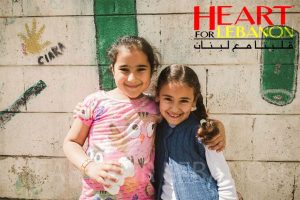
(Photo courtesy of Heart for Lebanon via Facebook)
“Our goal is to work on reconciling the refugee families, being agents of peacebuilding with the individuals that we are engaging in serious conversations — reconciling them with God their Creator, Jesus Christ as their personal Savior, and reconciling them with their neighbors.”
As Heart for Lebanon staffers engage in spiritual conversations with Syrian refugees, they have to opportunity to extend invitations to Bible studies and worship gatherings. And they’re seeing lives changed.
“We have worshipping communities now in the south of Lebanon and we are starting another one in the Bekaa [Valley],” says Camille. “We have 13 different Bible studies of folks who have accepted Christ as their personal Savior who want to be discipled and become mature Christians. This is what excites us!”
The operation costs around $240,000 every month for Heart for Lebanon to continue to support the number of families they work with. “It’s an ongoing need that we have on every given month. We have been extremely blessed by the partners, churches, individuals, foundations, and businesses — all faith-based, all with the same mission to share the love of Jesus and his compassionate heart with the people who are in need.”
Hope Ministry Center
Currently, Heart for Lebanon is running their Capital Campaign to raise funds for a 54,000 square-foot ministry building called the Hope Ministry Center. A foundation partner has committed to match every dollar given up to $300,000 to the Capital Campaign.
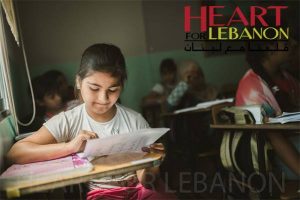
(Photo courtesy of Heart for Lebanon via Facebook)
Tom* with Heart for Lebanon explains, “That building is going to have a school for 250 children. It will allow us to double, a little bit more than double actually, our humanitarian aid to the refugees. It’s in the center of the migration route to and from Syria and is strategically located for the under-resourced Lebanese people as well.”
The Hope Ministry Center would also serve as a chapel for the refugee Church. Heart for Lebanon’s goal is to see this project fulfilled by the end of 2017.
Tom adds, “We’re full of gratitude because in the last three months…we were given a four-star rating by Charity Navigator, Excellence in Giving, and Charity Watch where they say 92-94% of every dollar given to us goes directly into programming. We work hard on that and we’re thankful for that.”
Click here to donate or to learn more about the Capital Campaign!
Prayer points
Finally, Camille says they could really use your prayers. “We don’t take prayer lightly at all. We know that we live in a very peculiar part of the world and we live in a very turbulent part of the world.”
Pray for….
- protection for the Heart for Lebanon staff and those they are ministering to.
- wisdom and discernment as they seek out individuals in need of aid.
- perseverance and that the staff would not become laden with compassion fatigue, but would have stamina from God to carry out their mission.
- health, both physically and spiritually.
- more workers to join Heart for Lebanon in this critical ministry to refugees in Lebanon.
You can also find more prayer requests at Heart for Lebanon’s website and on their Facebook page.
*Full name withheld for security purposes.
Unregistered Syrian refugees face obstacles in Lebanon
Lebanon (MNN) — The United Nations stopped registering Syrian refugees in Lebanon back in May 2015. It’s been over two years now and the UN only formally recognizes just over one million Syrian refugees in Lebanon. However, they admit that that population today has probably almost doubled.
Plight of the unregistered refugee

(Photo courtesy of Christian Aid Mission)
Camille* with Heart for Lebanon shares, “I was shocked to hear that the United Nations has stopped registering refugees in Lebanon since December 2015.… The key word here is those who are ‘registered’ with the United Nations. They would tell you there are easily an additional 600,000-700,000 refugees from Syria who live in Lebanon who are not registered.”
For displaced individuals, not being registered means you can’t get any government assistance. Any aid pledged by the UN can only go to registered refugees. This means around 40 percent of Syrian refugees in Lebanon are outside the reach of government aid.
“You’re talking about around 1.7-1.8 million [Syrian] refugees living in Lebanon. This is a country that has a population of 4 million individuals. After [those]1.8 million Syrian refugees, another 100,000 Iraqi refugees, and another half a million Palestinian refugees, more than half the population in Lebanon today is a refugee from a neighboring country.”
Restoring dignity
Heart for Lebanon is serving 3,000 Syrian refugee families each month — around 27,000 individuals — with schooling and physical aid.
Camille explains, “We are providing a basic food and hygiene supply package for every family on a monthly basis. This is roughly $80 worth of supplies of humanitarian aid, plus our opportunity to do the assessment…as well as follow-up visits we do almost on a daily basis.”
One of Heart for Lebanon’s focuses in refugee care is restoring dignity. And restoring dignity means more than dropping off aid and leaving. It means sitting, fellowshipping, spending time with refugee families, and hearing their stories.

(Photo courtesy of Heart for Lebanon via Facebook)
“Our goal is to work on reconciling the refugee families, being agents of peacebuilding with the individuals that we are engaging in serious conversations — reconciling them with God their Creator, Jesus Christ as their personal Savior, and reconciling them with their neighbors.”
As Heart for Lebanon staffers engage in spiritual conversations with Syrian refugees, they have to opportunity to extend invitations to Bible studies and worship gatherings. And they’re seeing lives changed.
“We have worshipping communities now in the south of Lebanon and we are starting another one in the Bekaa [Valley],” says Camille. “We have 13 different Bible studies of folks who have accepted Christ as their personal Savior who want to be discipled and become mature Christians. This is what excites us!”
The operation costs around $240,000 every month for Heart for Lebanon to continue to support the number of families they work with. “It’s an ongoing need that we have on every given month. We have been extremely blessed by the partners, churches, individuals, foundations, and businesses — all faith-based, all with the same mission to share the love of Jesus and his compassionate heart with the people who are in need.”
Hope Ministry Center
Currently, Heart for Lebanon is running their Capital Campaign to raise funds for a 54,000 square-foot ministry building called the Hope Ministry Center. A foundation partner has committed to match every dollar given up to $300,000 to the Capital Campaign.

(Photo courtesy of Heart for Lebanon via Facebook)
Tom* with Heart for Lebanon explains, “That building is going to have a school for 250 children. It will allow us to double, a little bit more than double actually, our humanitarian aid to the refugees. It’s in the center of the migration route to and from Syria and is strategically located for the under-resourced Lebanese people as well.”
The Hope Ministry Center would also serve as a chapel for the refugee Church. Heart for Lebanon’s goal is to see this project fulfilled by the end of 2017.
Tom adds, “We’re full of gratitude because in the last three months…we were given a four-star rating by Charity Navigator, Excellence in Giving, and Charity Watch where they say 92-94% of every dollar given to us goes directly into programming. We work hard on that and we’re thankful for that.”
Click here to donate or to learn more about the Capital Campaign!
Prayer points
Finally, Camille says they could really use your prayers. “We don’t take prayer lightly at all. We know that we live in a very peculiar part of the world and we live in a very turbulent part of the world.”
Pray for….
- protection for the Heart for Lebanon staff and those they are ministering to.
- wisdom and discernment as they seek out individuals in need of aid.
- perseverance and that the staff would not become laden with compassion fatigue, but would have stamina from God to carry out their mission.
- health, both physically and spiritually.
- more workers to join Heart for Lebanon in this critical ministry to refugees in Lebanon.
You can also find more prayer requests at Heart for Lebanon’s website and on their Facebook page.
*Full name withheld for security purposes.
15 days of prayer for the Hindu world
Int’l (MNN) – For nearly 25 years, Paul Filidis of WorldChristian.com has been inviting believers around the world to pray for Muslims through the 30 Days of Prayer for the Muslim World prayer guide. But for the first time, Filidis has created a prayer guide focused on the one-billion-plus followers of Hinduism.
How the prayer guide came about
Filidis is originally from Germany. His heart for Muslim people began when he was living in Afghanistan where he met his wife, became a believer, and started ministering. For the past 25 years, he’s lived in the United States, providing resources to Christians through his online bookstore.

The Hindu god, Ganesh.
When Filidis was first asked to be a part of creating a guide that helped Christians pray for Muslims, he thought it would be a one-time project.
But, he says, “It continued to grow and grow and it’s a big thing on everyone’s mind because we see the Islamic world featured every night on TV. And a lot of Christians may not know any Muslims and therefore the attitude that they have towards Muslims is one of fear or hatred.”
Every year, about 100,000 booklets are distributed in North America. More booklets are sent to other nations as well. Through prayer, believers around the world are growing their heart for Muslims as they ask God to reveal Jesus to them.
A heart for Hindus, too
But the growing interest got people thinking about what other prayer guides could be created. Filidis says last year, he was approached by people from the United Kingdom, India, and Texas. They all had one request for him—create a prayer guide focusing on the Hindu world.
“They felt a godly jealousness to want to also see the Hindu world promoted to a similar degree. We all know that, of course, Hinduism is not on the news every night, so it will not be as big as the Muslim prayer focus.”
But the prayer guide will help to activate the Body of Christ in prayer for Hindus as well. The days of prayer kicked off this past Sunday, October 8, and will continue through the 22nd. These dates roughly coincide with a season of Hindu festivals, but the guide is not limited to this date range.
Aside from North American participants, Filidis says other nations have expressed interest—New Zealand, Australia, the United Kingdom, and the Philippines. “I can already say it’s an international prayer mobilization.”
The first run of booklets—10,000 copies—ran out even before September ended. A few thousand more were printed.
Missions at home
But it’s not just about praying for people far, far away. It’s about preparing for interactions that might take place in your own community.
“Traditionally we’ve always talked about missions going to other parts of the world. And nowadays, we see a lot of the world coming to us. So missions is becoming much easier in a sense–if we as the North American Church or the Western Church could open our hearts and embrace people and welcome people.”
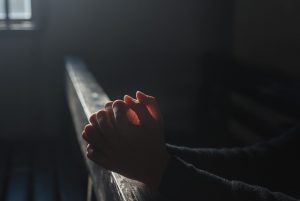 Fidilis emphasizes the importance of this welcoming attitude. For people coming from a totally different country or culture, a welcome means so much. It’s the beginning of building a relationship where Christ can be exemplified and shared with others. That brings up another aspect of this guide.
Fidilis emphasizes the importance of this welcoming attitude. For people coming from a totally different country or culture, a welcome means so much. It’s the beginning of building a relationship where Christ can be exemplified and shared with others. That brings up another aspect of this guide.
“If we want to affect the world in which we live, we need to understand the world in which we learn. And part of it is that the world is internationalizing,” Fidilis says. He explains that when people come from different parts of the world, it’s important to learn about them.
“What excites me about the 15 Days of Prayer for the Hindu world… is the fact that it is not just a list of items to pray for, but it has pictures, it has text. In other words, it has an [educational] element to it. People can learn about people in the … Hindu world. People can learn as they read through it and that gives a little bit more context to pray with understanding.”
While the days of prayer have already begun, you can still get your copy, either digitally or as a hardcopy. And don’t feel like you have to limit the prayer to these 15 days. The guides are wonderful prayer tools for individuals, small groups, and churches all year round. Click here to get your copy!
House passes bill criminalizing abortion after 20 weeks
United States (MNN) – There’s been significant political action recently in favor of the sanctity of human life. On Oct 3, the House of Representatives passed legislation that would criminalize abortions after 20 weeks of pregnancy, save for situations of incest, rape, or when the life of the mother is threatened.
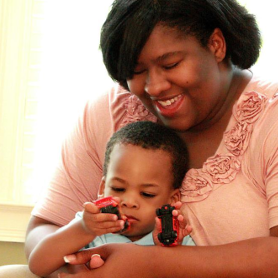
(Photo courtesy of Bethany Christian Services)
Kris Faase with Bethany Christian Services explains: “This has been introduced into Congress before, but it basically is taking the knowledge that we now have, which is different than what we knew in 1973 when Roe v. Wade passed, that a baby, a preborn child at the 20 weeks gestation, or earlier, can feel pain, and responds to pain.”
In January 2017, Republican Representative Trent Franks reintroduced the bill, known as the Pain-Capable Unborn Child Protection Act, in the House. Similar legislation passed the House in 2013 and 2015, but failed in the Senate. After passing the House with a vote of 237-189, Republican Senator Lindsey Graham reintroduced it into the Senate two days later.
The bill argues from the premise that infants are capable of feeling pain by the time they are 20 weeks old. Doctors disagree on whether this is true, since pain is a subjective experience, but they do provide anesthetics for both the mother and fetus at this stage during fetal operations.
“One of the issues in the early abortion discussion talked about age of viability,” Faase says. “What we know with medical science, that age has changed dramatically over the years. So now, very young babies are being born at a very early stage and are surviving, and we have the medical care for them to make sure all of their physical and developmental needs are met.”
Bethany believes every child has a right to enter into life and be cared for by a loving family. But since abortion is such a polarizing issue, Faase says it’s important we search for common ground in order to have meaningful dialogue.
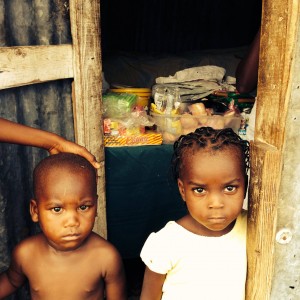
(Photo courtesy of Bethany Christian Services via Facebook)
“What I would love to see people do is to continue to educate themselves,” Faase says. “Science, as God has revealed it to us, has shown us so much about what happens in that miracle of life.
“This a wonderful opportunity to educate ourselves and to continue to dialogue and work to bridge gaps because, at the end of the day, we all want what’s best for that child and for their parents, whether that parent parents them, and we support that family, or that parent says, ‘I’m not ready at this time,’ and the parent makes an adoption decision.”
Want to learn more about Bethany’s work and how you can support its efforts in defending the sanctity of human life? Click here to learn more about Bethany’s services, or click here for ways to volunteer, support a family, or donate.
ISIS progresses toward mass genocide of Christians and Yezidis
Iraq (MNN) – For religious minorities in Iraq, time is running short.
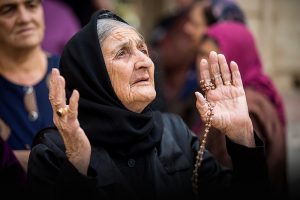
(Photo Courtesy of Open Doors USA)
The Islamic State is inching closer to its goal of eradicating Christians and Yezidis from their historic homeland. Over the past 14 years, the number of Iraq’s Christians has dropped from 1.5 million to 250,000. About 3,000 men and women of the Yezidi minority—ethnically Kurdish people whose religion contains elements of Zoroastrianism, Christianity, and Islam—remain enslaved by ISIS.
Former Congressman Frank Wolf recently testified before the U.S. House and Senate following his trip to Iraq. He discussed the severity of the situation and the opportunity we have to prevent it. He finished his testimony with four recommendations, as reported by Religion News Service:
- Our government needs “fresh eyes” in Iraq with regard to our current policies to provide humanitarian aid as well as protect our national security interests.
- President Trump should issue a Presidential Decision Directive or Presidential Memorandum directing the State Department and USAID to immediately address the needs to communities identified by Secretary Tillerson as having been targeted for genocide.
- A post should be established by the White House for an inter-agency coordinator to guarantee that the needs of these communities are adequately addressed to ensure their safety and preservation consistent with U.S. foreign policy.
- Congress should immediately pass H.R. 390, the bipartisan Iraq and Syria Genocide Emergency Relief and Accountability Act, authored by Chairman Chris Smith (R-NJ) and coauthored by Congresswoman Anna Eshoo (D-CA).
We spoke with Open Doors USA Advocacy Director Kristin Wright for some context on the crisis: “This campaign to exterminate these groups and to literally raid Iraq of Christians and Yezidis is one that is ongoing, and I think a lot of people don’t realize that just because ISIS is being pushed back, in certain areas, that doesn’t mean that the threat is over.
“In fact, as we’re witnessing firsthand, the hour is late right now for Christians and for Yezidis in the region, and that’s because many are realizing that the only option they have is to leave Iraq if they want education for their children, security, a future.”
On October 5, the Senate Foreign Relations Committee passed H.R. 390. If signed by Congress, it would provide more funding for emergency relief for victims of genocide in Iraq and Syria, as well as hold the perpetrators accountable.
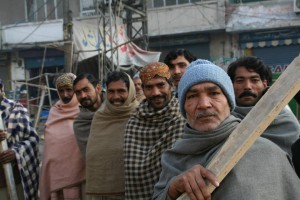
(Photo courtesy of Open Doors USA)
“It’s more timely than ever that we look at flexible funding to help preserve these groups and these communities,” Wright says. “We need to look at Iraq, as former Congressman Wolf mentioned, with fresh eyes. We need to analyze the situation, and the aid situation needs to be targeted. We need to be looking at the preservation of the Yezidis, the preservation of Christians, and the preservation of the Turkmen, and these other smaller groups that have been targeted specifically by ISIS.”
Open Doors is working on the ground in Iraq, providing food, education, and biblical counseling for those who have been traumatized. It’s also launched a campaign called Hope for the Middle East with a goal of raising one million signatures in support of persecuted believers.
“One of the unique things about this campaign is that it actually originated with Christians on the ground in Iraq, where we went firsthand and asked them, ‘What would you like to see and hear as far as action from our government officials at the United Nations and at the highest levels of government around the world?’” Wright says. “And what they asked for was sustainability. They’re looking for hope. They’re looking for a right to equal citizenship, for dignified living conditions, and for a prominent role in rebuilding their society.”
The situation is becoming increasingly dire every moment, but through organizations like Open Doors, you can help give hope to those who have none. Click here to sign Open Doors’ petition, or click here for other ways to get involved.




